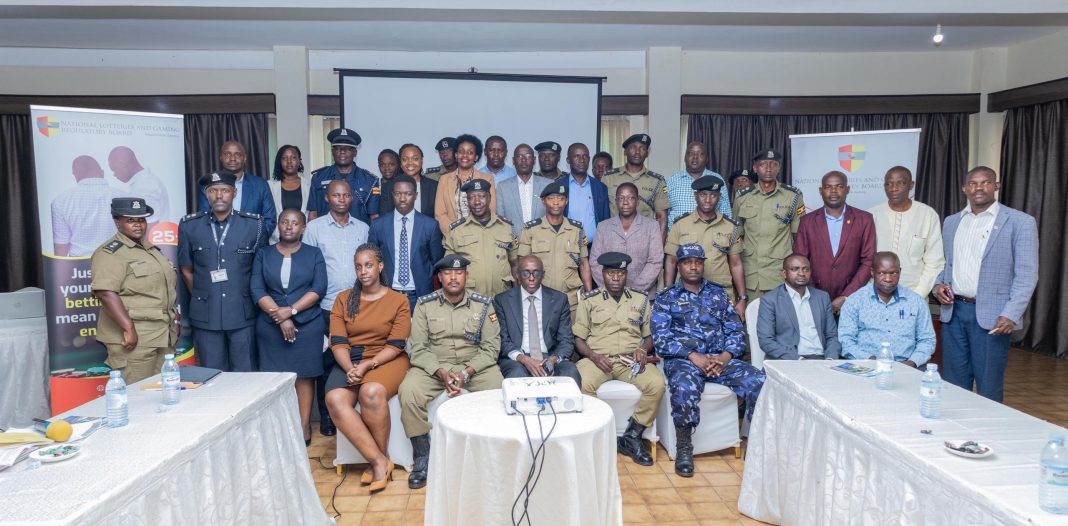In a bid to strengthen stakeholder collaboration and bolster regulatory enforcement in Uganda’s gaming sector, the National Lotteries and Gaming Regulatory Board (NLGRB) held a high-level engagement with Uganda Police Force officials from the Rwizi Region. The engagement, hosted at Lake View Hotel in Mbarara on May 27, 2025, brought together District Police Commanders (DPCs), Officers in Charge of Criminal Investigations (OCIDs), local leaders, and other technical stakeholders from across the region.
The meeting focused on aligning enforcement strategies, enhancing compliance, and deepening the understanding of Uganda’s gaming laws under the Lotteries and Gaming Act, Cap 334. In his opening remarks, NLGRB CEO Mr. Denis Mudene emphasised the strategic collaboration between the Board and the Uganda Police Force in enforcing gaming regulations to protect citizens and maintain public order.
“Gaming is not a business or a guaranteed money-making venture. It is a leisure activity, and we encourage only those of legal age to participate responsibly,” Mr. Mudene stated.
A key highlight from the session was the clarification around age restrictions in gaming. Mr. Mudene noted that while sports betting, casino games, and bingo are strictly reserved for individuals aged 25 and above, the National Lottery, issued by the Minister of Finance for public good causes is open to individuals aged 18 and above.
“The national lottery is the only license that permits participation from 18 years. This distinction is important to ensure both the public and operators comply with the law,” he clarified.
Mr. Mudene raised concerns over the growing trend of children using parents’ phones to gamble online. He warned parents against registering SIM cards under their names and passing them on to minors, as this facilitates undetected underage gambling.
“93% of gambling happens online, mostly by corporates. However, when a phone registered in a parent’s name is used by a 15-year-old, they pass all verification checks,” he explained, urging responsible digital parenting.
Mbarara City Mayor, Robert Mugabe Kakyebezi, commended the Board’s efforts in bringing regulatory oversight closer to communities. He raised alarm over the prevalence of unlicensed betting operations and children misusing school fees or resorting to theft to fund gambling.
“We appreciate this engagement. It’s been a problem for us to control betting centres operating illegally. Now, with the clarification that sports betting is for those aged 25 and above, it gives us a firmer ground for enforcement,” the mayor said.
He called for rigorous measures against operators who flout regulations, stating that mere license revocation is insufficient and that arrests should follow when crimes are committed.
DeputyRegional Police Commander Rwizi Region, SSP Bosco Bakashaba, reaffirmed the Uganda Police Force’s commitment to upholding the law in partnership with the NLGRB.
“We shall offer total support to reduce offenses and illegal operations. Gaming houses that admit underage individuals or operate without licenses, especially in villages, will face legal consequences,” SSP Bakashaba asserted.
He highlighted the use of crime intelligence and informants to trace illegal slot machines and betting centres in unauthorised locations.
“Gaming is like a razorblade, used correctly, it’s useful. Used wrongly, it causes harm,” he concluded.
Since its inception in 2017, the National Lotteries and Gaming Regulatory Board has steadily expanded its reach. Starting July 1, 2025, regional offices in Mbarara, Gulu, and Mbale will become operational, with plans to establish six offices countrywide to improve oversight and service delivery.
The engagement underscored the need for continued sensitisation, collaborative enforcement, and community responsibility in tackling the social risks associated with gambling.
As Uganda’s gaming sector continues to grow, such engagements between regulators, enforcers, and community leaders are crucial to ensure a safe, transparent, and accountable industry anchored in the law and driven by shared responsibility.


